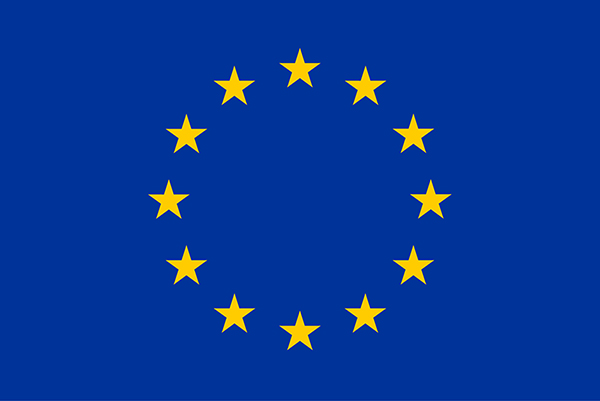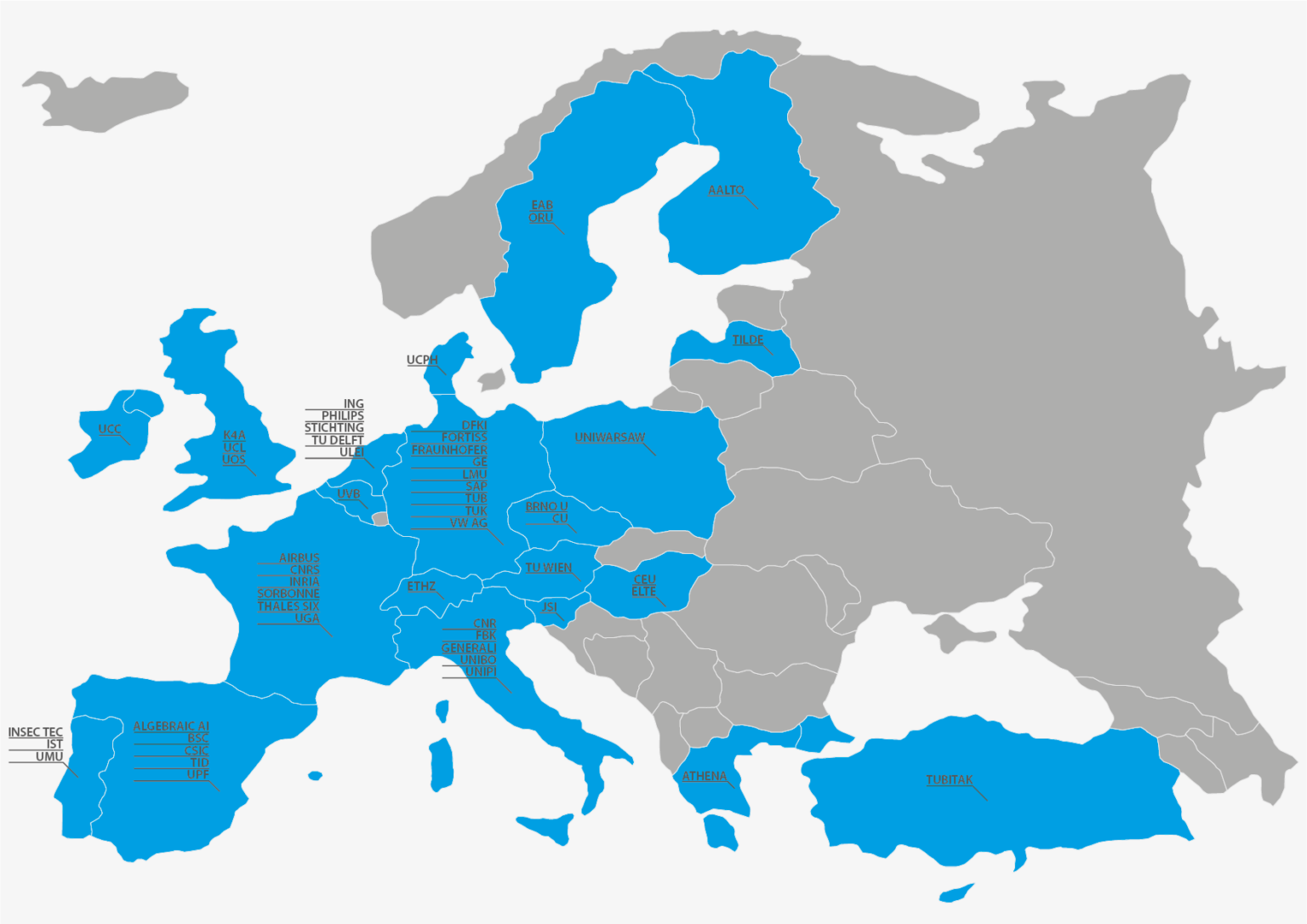

European Network of Human-centered Artificial Intelligence
The European Network of human-centered artificial intelligence aims to facilitate a European brand of trustworthy, ethical AI that enhances Human capabilities and empowers citizens and society to effectively deal with the challenges of an interconnected globalized world. The project wants to leverage the synergies between European centers of excellence to develop the scientific foundations and technological breakthroughs needed to shape the AI revolution in a direction that is beneficial to humans both individually and societally, and that adheres to European ethical values and social, cultural, legal, and political norms.
The core challenge is the development of robust, trustworthy AI systems capable of what could be described as “understanding” humans, adapting to complex real-world environments, and appropriately interacting in complex social settings. The aim is to facilitate AI systems that enhance human capabilities and empower individuals and society as a whole while respecting human autonomy and self-determination. The HumanE AI Net project will engender the mobilization of a research landscape far beyond direct project funding, involve and engage European industry, reach out to relevant social stakeholders, and create a unique innovation ecosystem that provides a manyfold return on investment for the European economy and society.
Facilitating this vision requires new solutions to fundamental scientific questions - not just within narrow classical AI silos, but at the interstice of various AI areas such as learning, reasoning, and perception on one side, and particularly for other disciplines, human-computer interaction (HCI), cognitive science, and the social sciences.
The following are specific research areas where substantial gaps exist today that will be addressed in the course of the project:
1. Human-in-the-loop machine learning, reasoning, and planning. Allowing humans to not just understand and follow the learning, reasoning, and planning process of AI systems (being explainable and accountable), but also to seamlessly interact with it, guide it, and enrich it with uniquely human capabilities, knowledge about the world, and the specific user’s personal perspective.
2. Multimodal perception and modeling. Enabling AI systems to perceive and interpret complex realworld environments, human actions, and interactions situated in such environments and the related emotions, motivations, and social structures. This requires enabling AI systems to build up and maintain comprehensive models that, in their scope and level of sophistication, should strive for more human-like world understanding and include common sense knowledge that captures causality and is grounded in physical reality.
3. Human-AI collaboration and interaction. Developing paradigms that allow humans and complex AI systems (including robotic systems and AI-enhanced environments) to interact and collaborate in a way that facilitates synergistic co-working, co-creation and enhancing each other’s capabilities. This includes the ability of AI systems to be capable of computational self-awareness (reflexivity) as to functionality and performance, in relation to relevant expectations and needs of their human partners, including transparent, robust adaptation to dynamic open-ended environments and situations. Overall, AI systems must above all become trustworthy partners for human users.
HumaneAI was publicly launched in Berlin on 1 March 2019 with end date 30 April 2020 in Brussels.
This project has received funding from the European Union’s Horizon 2020 research and innovation programme under grant agreement No 761758.

Workpackages
- WP 1 Human-in-the-Loop Machine Learning, Reasoning and Planning
- WP 2 Multimodal Perception and Modeling
- WP 3 Human AI Collaboration and Interaction
- WP 4 Societal AI
- WP 5 AI Ethics and Responsible AI
- WP 6 Applied research with industrial and societal use cases
- WP 7 Innovation Ecosystem and Socio-Economic Impact
- WP 8 Virtual Center of Excellence, Capacity building and Dissemination
- WP 9 Synergies with AI on demand platform(s) and the Broader European AI Community
Within Human-AI-Net, UNIMORE contributes to WP 8:
This WP is devoted to the aim of fostering excellence, increasing the efficiency of collaboration, disseminating the latest and most advanced knowledge to all the academic and industrial AI laboratories in Europe and making HumanE AI Net the center of a vibrant AI network in Europe. This includes implementing and operating the Virtual Laboratory, integration of the Virtual Laboratory with the AI4EU platform, running the industrial Ph.D., postdoc and internship program, running the dissemination events to all relevant target groups (from scientific summer schools to workshops for policy makers and participation in public festivals) and the creation and distribution of relevant dissemination and knowledge spreading materials (from MOOCs, through policy brochures to general public facing YouTube videos). The work in this WP is centered around the implementation and operation of the Virtual Laboratory closely interwoven with the AI4EU platform. The Laboratory will not only be a one stop access point for outside the consortium, but also the main collaboration platform within the consortium (leveraging the respective AI4EU mechanism where possible), means to organize and manage a project generated materials and means
for the coordination of various events and the Ph.D./postdoc and internship programs where appropriate.
UNIMORE’s contribution to WP8 will be within Knowledge dissemination events for the European AI community. In particular, UNIMORE will help to organise and coordinate the scientific summer schools organized within the project, tutorials and workshops as a key instrument of knowledge spreading to the scientific and industrial R&D community. As part of this task, UNIMORE will help to organize an annual summer school on human-centric AI. As well, UNIMORE will disseminate the project in the the network of the "Advanced summer schools in AI" scheduled for 2021 to 2022 in the universities of Modena, Bologna and Ferrara, and co-funded by Emilia-Romagna region under EU FESR program in 2019.
Partners
Artificial Intelligence is made by humans, European researchers and citizens, who care deeply about the future of AI in Europe and its use for the benefit of all Europeans. The researchers in HumaneAI are coming from 53 institutions across 20 European countries, with coverage stretching comprehensively from east to west and from south to north:

- Deutsches Forschungszentrum für Künstliche Intelligenz GMBH (Coordinator), DE
- AALTO Korkeakoulusaatio SR, FI
- Airbus Defence and Space SAS, FR
- Algebraic AI S.L., ES
- Athena-Erevnitiko Kentro Kainotomias Stis Technologies Tis Pliroforias, Ton Epikoinonion Kai Tis Gnosis, EL
- Vysoke Uceni Technicke V Brne, CZ
- Barcelona Supercomputing Center – Centro Nacional De Supercomputacion, ES
- Közép-Európai Egyetem (CEU), HU
- Consiglio Nazionale Delle Ricerche, IT
- Centre National De La Recherche Scientifique CNRS, FR
- Agencia Estatal Consejo Superior Deinvestigaciones Cientificas, ES
- Univerzita Karlova, CZ
- Consorzio Internuviersitario Nazionale Informatica, IT
- Eotvos Lorand Tudomanyegyetem, HU
- Eidgenoessische Technische Hochschule Zuerich, CH
- Fondazione Bruno Kessler, IT
- FORTISS GMBH, DE
- Fraunhofer Gesellschaft Zur Foerderung der Angewandten Forschung E.V., DE
- Generali Italia S.p.A., IT
- German Entrepreneurship GMBH, DE
- INESC TEC – Instituto De Engenhariade Sistemas E Computadores, Tecnologia E Ciencia, PT
- ING GROEP NV, NL
- Institut National De Recherche En Informatique Et Automatique, FR
- Instituto Superior Tecnico, PT
- Institut Jozef Stefan, SI
- Knowledge 4 All Foundation, UK
- Ludwig-Maximilians-Universitaet Muenchen, DE
- Orebro University, SE
- Philips Electronics Nederland B.V., NL
- SAP SE, DE
- Sorbonne Universite, FR
- STICHTING VU, NL
- 33 – Thales Six Gts France SAS, FR
- Telefonica Investigacion Y Desarrollo SA, ES
- TILDE SIA, LV
- Technische Universitat Berlin, DE
- Turkiye Bilimsel Ve Teknolojik Arastirma Kurumu, TR
- Technische Universiteit Delft, NL
- Technische Universitaet Kaiserslautern, DE
- Technische Universitaet Wien, AT
- University College Cork – National University of Ireland, Cork, IE
- Kobenhavns Universitet, DK
- Universite Grenoble Alpes, FR
- Universiteit Leiden, NL
- Umeå Universitet, SE
- Alma Mater Studiorum – Università Di Bologna, IT
- Università Di Pisa, IT
- University College London, UK
- Uniwersytet Warszawski, PL
- The University of Sussex, UK
- Universidad Pompeu Fabra, ES
- Vrije Universteit Brussel, BE
- Volkswagen AG, DE
Project Info
